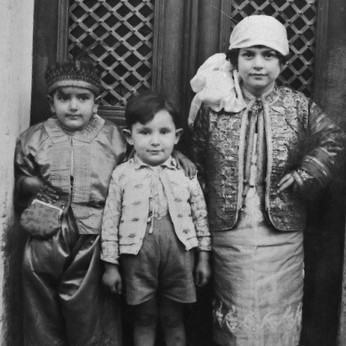“La tefila, la tefila” — the Judeo-Spanish call to worship echoed through the cobblestone streets. The caller’s reminder to the faithful mingled with a whispering sea breeze and the first chirps of bird melodies.
Mornings were typically the same in Jewish neighborhoods across prewar Greece.
Mothers and fathers stirred from slumber as the fragrances of jasmine, rose and lavender floated from open windows. They busied themselves with getting daughters and sons ready for school. But first, warm bread and homemade marmalade for breakfast started the day.
Kitchen tables were cleaned off and bed linens were aired outside in the courtyards. Sing-song melodies filled the air across patios as binding companionships among women. But they had competition — “Buy brooms!” called out one peddler, and another one shouted “Vegetables for sale!” The cloudless mornings evolved into hot sunny days.
Singing children’s voices could be heard as they walked to and from school. Later, teenagers were singing, laughing and flirting as they gathered at the communal oven for their families’ cooked dinners.
A newborn’s first cries brought joy to some families’ lives. But benevolent spirits were needed also; that explained the need to wear an amber amulet or to tie red thread around a baby’s wrist — all to keep the “evil eye” away. These folk beliefs gave mothers support for unexpected risks involved with being pregnant, giving birth and the wellbeing of a newborn.
Sundays were beautiful days at the beach. Mothers and fathers, friends and neighbors relaxed. Children ran back and forth, calling out to each other and splashed with abandon in the azure tinted Aegean Sea. Joyful memories were made for a lifetime.
Prayer books became worn beyond use with torn or damaged pages. Adults or a girl or boy could be seen walking toward the genizah, the storehouse for sacred texts. The unusable books were pushed through its small window. Every so often, the assistant rabbi could be seen carrying the deposited books to bury them in the local Jewish cemetery.
Jews lived from the northern port of Thessaloniki to the far island of Rhodes in the Aegean Sea. Thessaloniki was referred to with the term, “La Madre Sephardi de Yisrael,” (the Sephardic mother of Israel) in 1537, a much admired place imbued with Jewish history.
Stella Levi, a Jewish woman who grew up on Rhodes, reminisced about her girlhood in 2022, saying, “It was our own little piece of the earth.” Many other Holocaust victims thought the same of their homelands.
No part of Greece was spared from the destructive force of the Nazi army.
I believe we must acknowledge and understand the crushing tragedy of the Shoah. We must also remember the reality that Jews were leading valuable lives surrounded by beloved families and strong communities.
It matters that we recollect the all-embracing lives of these Jews. We are, after all, their descendants. We live deeply enriched existences because of our dear ones and our people. How else would we have built our lives, if not from the past, “kedem?” Appreciating our heritage sustains and moves us forward with hope.
Storytelling can powerfully illuminate our past. Every person was important in the life she or he led. Their memorable lives can help us understand how much of what they cherished was robbed from them, us and the world.
They upheld our most revered values: honoring one’s mother and father, engaging in acts of kindness, studying morning and evening, visiting the sick, providing for the wedding couple, being present for the dead for burial, and dedicating oneself to prayer and to making peace with others. The study of our sacred Torah holds them all. These valuable beliefs can enrich our own days which are especially stressed during these trying times.
What would the world look like if scholars, research studies and all of us directed more attention to prewar Jewish life? Our world would be enriched with six million and survivors’ life stories. Everyone would learn that Jews created strong family ties through deeply held Jewish values, traditions and teachings as they went about their daily lives, and by doing so, they created an amazing tapestry of far reaching communities throughout Europe. These important triumphs would be enduring legacies forever.
Mary M. Greenberg, Ph.D., serves on the State of Kansas Holocaust Commission. Her speaking engagements on preventing antisemitism are based on her research that advances the study of the Jewish people in the Diaspora. She is dedicated, also, to writing about how a Jewish perspective enriches our contemporary lives.



